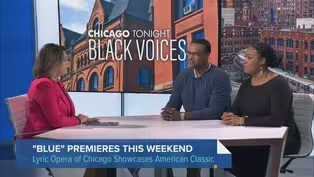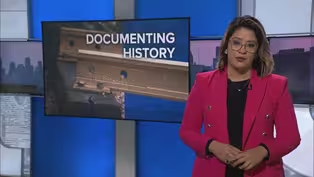Chicago Tonight: Black Voices
South Side Residents Take Part in a Study on Reparations
Clip: 11/13/2024 | 8m 9sVideo has Closed Captions
A new report focuses on 10 Chicago neighborhoods, seeking people's thoughts on reparations.
America’s so-called war on drugs was intended to reduce illegal narcotic use but instead led to decades of criminalization, the incarceration of millions of people and increased levels of violence. According to a new report, the war on drugs is one reason some South Side residents say they could be owed a form of reparations.
Problems playing video? | Closed Captioning Feedback
Problems playing video? | Closed Captioning Feedback
Chicago Tonight: Black Voices is a local public television program presented by WTTW
Chicago Tonight: Black Voices
South Side Residents Take Part in a Study on Reparations
Clip: 11/13/2024 | 8m 9sVideo has Closed Captions
America’s so-called war on drugs was intended to reduce illegal narcotic use but instead led to decades of criminalization, the incarceration of millions of people and increased levels of violence. According to a new report, the war on drugs is one reason some South Side residents say they could be owed a form of reparations.
Problems playing video? | Closed Captioning Feedback
How to Watch Chicago Tonight: Black Voices
Chicago Tonight: Black Voices is available to stream on pbs.org and the free PBS App, available on iPhone, Apple TV, Android TV, Android smartphones, Amazon Fire TV, Amazon Fire Tablet, Roku, Samsung Smart TV, and Vizio.
Providing Support for PBS.org
Learn Moreabout PBS online sponsorship>> The country's war on drugs launched in the 1970's was intended to reduce illegal drug use.
But instead it led to decades of criminalization and incarceration for millions of people and even increased levels of violence.
That so-called war is one reason.
Some Southside residents say they could to form of reparations.
It's laid out in a recent report from the Chicago Urban League.
And joining us now is Chicago Urban League CEO Karen Freeman.
Wilson, welcome back.
Thank Great be here.
So the study it focuses on 10 Southside community that folks can see on the screen.
But I will read them out.
Douglas Englewood, Fuller Park, Grand Boulevard, Greater Grand Crossing Oakland, South Shore, Washington Park, West Englewood and Woodlawn.
Tell us about these communities and why they are the focus of this report.
>> Well, the reason that the report focused on those communities brand is is that it was a part of the are 3.
Appropriation from the state of Illinois, which meant that it was only good for certain areas or it only be used in certain areas that I 3 standing We store, we invest.
>> And we commit either the cannabis dollars, the cannabis dollars.
And so while we focus on those areas, the report is not only relevant to those areas because we think that there are facts and you aspects of the report that we can extrapolate for other areas of the south and West sides.
It well.
>> So in the report are through to research.
What you learn about how residents view reparations?
>> we went into the report thinking this is something that could be done as a group or community effort and the main thing that residents say it was that reparations are for individuals, you know, and I think we went into the report.
We were thinking we want to make it somewhat more acceptable and easier to pass either at the state.
>> federal level at the local level.
>> But reality is that people feel that the harm has impacted them as individuals.
It has impacted their families.
And that's has impacted us.
And so to the extent that the harm has individually, we believe and the report tells us the repair.
>> be toward individuals as well.
>> A lot of people might look at this project and think, you know, Chicago's northern City, it does not have the same history of slavery and to some extent, Jim Crow, as in a lot of southern states, what folks need to know about why black Chicagoans should also be acknowledged in the fight for reparations.
So what we understand about Chicago is that >> the banks.
>> In Chicago benefited from slavery.
>> many of the institutions in terms of retail institutions that were the basis we're building Chicago benefited from slavery.
And so it's not a north-south thing.
This entire country was built on the backs of flames.
>> And even though you have more than cities.
>> You can trace the benefit of slavery as far north as Maine.
>> So black Americans, you've named a couple of things.
All right.
We can look back over the decades over the centuries and find multiple reasons that they think, you know, reparations for which reparations could be made slavery.
Obviously, Jim Crow laws, redlining and housing discrimination.
Why the war on drugs?
>> The war on drugs because it is simply an extension of the other aspects of our lives, reconstruction, lynching, Jim Crow laws, redlining contracts, the House station, a real estate contract.
And what we saw was when the war on drugs.
Was fought.
It was, you know, they'll does something that was meant to help people.
But ultimately the in equities inherent in enforcing that war and in waging that war.
Add a disparate impact in the black community among the policy recommendations from the report are guaranteed income programming.
A public acknowledgment and apology.
>> Integration of truth and reconciliation work that just names a few.
But why are some of these important and how it some of them work?
>> Well, these are important because in order to repair something you have to acknowledge that something is broken.
And to say that.
This war had a terrible impact on the community and not just on those who are incarcerated because they were arrested.
But because of the way that drugs left, the community in terms of the parents the South side neighborhoods.
And so you have that and then you have the fact that when you try to come together when you try to correct something, if you acknowledge that there is something wrong, then there may be more resolve on the part of those who benefited from that wrong.
And those who may have perpetrated that wrong if there's a resolve on their part, the you more likely chance of having it.
Correct.
>> Study also proposes adding lessons on civil rights and the war on drugs to the Chicago Public Schools and City college's curricula.
Why do you think that's necessary?
>> because it's important.
I think it's necessary so that people will understand that the violence that we see the challenges that we see, the blight that we see in our communities.
It just didn't happen.
It didn't happen because people are more violent and more prone to do certain things.
It happened because of a history of violence from the slave coals on history of violence, from the war on drugs, a history of really diss investing in our communities and using drugs as an excuse.
Karen, what's next?
How do you turn this report into action steps in to change?
Well, we're able to sell into work that's already been being done.
Can Howard, who's almost the father of reparations has come up with a set of actions steps that we would welcome people to take a look at consider things like supporting HR 40, which is the federal resolution to create a rest reparations commission.
We also know that the city of Chicago has begun work on creating task force so that we can study this issue and consider it the universal.
Basic income work that's being done both in the city and the county ways that we can also address this.
All of those are important and the Urban League we consider ourselves convene ERs or at least helping people to understand that there are concerted efforts that we can take together to get this done.
So it sounds like you think there's there's already
New Opera Explores Black Family's Grief, Journey Toward Healing
Video has Closed Captions
Clip: 11/13/2024 | 8m 29s | "Blue" follows a family grappling with grief after they lose their son to police violence. (8m 29s)
Task Force Releases Findings on Illinois' Role in Underground Railroad
Video has Closed Captions
Clip: 11/13/2024 | 2m 29s | There could be at least 200 sites in Illinois that are part of the network. (2m 29s)
Providing Support for PBS.org
Learn Moreabout PBS online sponsorship
- News and Public Affairs

Top journalists deliver compelling original analysis of the hour's headlines.

- News and Public Affairs

FRONTLINE is investigative journalism that questions, explains and changes our world.












Support for PBS provided by:
Chicago Tonight: Black Voices is a local public television program presented by WTTW

